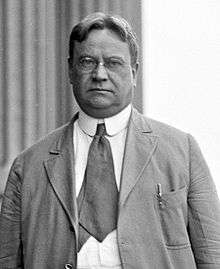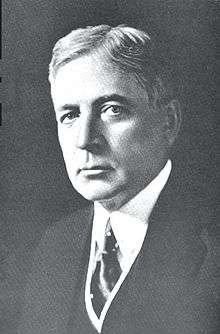Republican Party presidential primaries, 1920
| | |||||||||||||||||||||||||||||||||||||||||||||||||||||||||||
| |||||||||||||||||||||||||||||||||||||||||||||||||||||||||||
| |||||||||||||||||||||||||||||||||||||||||||||||||||||||||||
| |||||||||||||||||||||||||||||||||||||||||||||||||||||||||||
The 1920 Republican presidential primaries were the selection process by which voters of the Republican Party chose its nominee for President of the United States in the 1920 U.S. presidential election. The nominee was selected through a series of primary elections and caucuses culminating in the 1920 Republican National Convention held from June 8 to June 12, 1920, in Chicago, Illinois.[1]
Candidates
Nominee
Withdrew during convention
Withdrew during primaries

Edward R. Wood
from Pennsylvania
Results
| State | Date | Hiram Johnson | Leonard Wood | Frank O. Lowden | Herbert Hoover | Edward R. Wood | Warren G. Harding | John J. Pershing | Unpledged |
|---|---|---|---|---|---|---|---|---|---|
| New Hampshire | March 9 | 12.3% | 53.0% | 0.0% | 0.0% | 0.0% | 0.0% | 0.0% | 34.6% |
| North Dakota | March 16 | 96.1% | 3.1% | 0.2% | 0.0% | 0.0% | 0.0% | 0.0% | 0.0% |
| South Dakota | March 23 | 30.7% | 36.5% | 31.5% | 0.0% | 0.0% | 0.0% | 0.0% | 0.0% |
| Michigan | April 5 | 38.4% | 27.5% | 15.3% | 12.8% | 0.0% | 0.0% | 0.0% | 0.0% |
| New York | April 6 | 0.0% | 0.0% | 0.0% | 0.0% | 0.0% | 0.0% | 0.0% | 100.0% |
| Wisconsin | April 6 | 8.0% | 15.0% | 3.1% | 13.0% | 0.0% | 0.0% | 0.0% | 0.0% |
| Illinois | April 13 | 13.8% | 33.8% | 51.1% | 0.7% | 0.0% | 0.0% | 0.0% | 0.0% |
| Nebraska | April 20 | 46.2% | 31.0% | 0.0% | 0.0% | 0.0% | 0.0% | 20.3% | 0.0% |
| Montana | April 23 | 52.4% | 17.0% | 16.2% | 12.6% | 0.0% | 1.8% | 0.0% | 0.0% |
| Massachusetts | April 27 | 0.0% | 0.0% | 0.0% | 0.0% | 0.0% | 0.0% | 0.0% | 100.0% |
| New Jersey | April 27 | 49.0% | 50.2% | 0.0% | 0.9% | 0.0% | 0.0% | 0.0% | 0.0% |
| Ohio | April 27 | 6.5% | 41.9% | 0.0% | 4.0% | 0.0% | 47.6% | 0.0% | 0.0% |
| Maryland | May 3 | 33.6% | 66.4% | 0.0% | 0.0% | 0.0% | 0.0% | 0.0% | 0.0% |
| California | May 4 | 63.9% | 0.0% | 0.0% | 36.1% | 0.0% | 0.0% | 0.0% | 0.0% |
| Indiana | May 4 | 35.3% | 37.9% | 17.5% | 0.0% | 0.0% | 9.2% | 0.0% | 0.0% |
| Pennsylvania | May 18 | 3.8% | 1.4% | 0.0% | 1.0% | 92.3% | 0.0% | 0.0% | 0.0% |
| Vermont | May 18 | 7.7% | 66.1% | 0.5% | 10.8% | 0.0% | 0.0% | 0.0% | 0.0% |
| Oregon | May 21 | 38.4% | 36.5% | 13.0% | 12.1% | 0.0% | 0.0% | 0.0% | 0.0% |
| West Virginia | May 25 | 0.0% | 44.6% | 0.0% | 0.0% | 0.0% | 0.0% | 0.0% | 0.0% |
| North Carolina | June 5 | 73.3% | 26.7% | 0.0% | 0.0% | 0.0% | 0.0% | 0.0% | 0.0% |
| Legend: | 1st place (popular vote) |
2nd place (popular vote) |
3rd place (popular vote) |
|---|
See also
References
- ↑ "Guide to U.S. Elections - Google Books". Books.google.com. 2016-02-19. Retrieved 2016-02-19.
This article is issued from Wikipedia - version of the 11/27/2016. The text is available under the Creative Commons Attribution/Share Alike but additional terms may apply for the media files.




